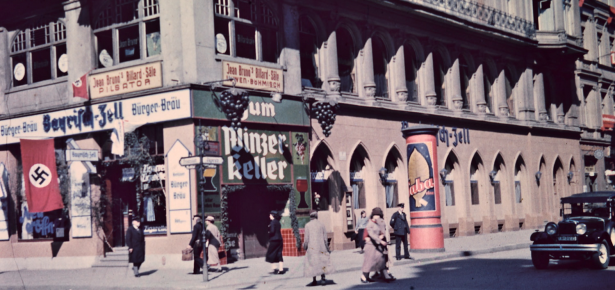
‘If you aren’t willing to talk about capitalism, you had better keep quiet about fascism’, wrote Max Horkheimer on the eve of the Second World War. Time and again, left-wing antifascists have cited this statement by one of the Frankfurt School’s founding fathers. But what can actually be said about the relationship between the capitalist economic order and Nazi rule in the light of historical research?
Any attempt at historical analysis has to begin by considering the tensions and contradictions that marked capitalism during the Weimar Republic. After 1918, long-term trends towards rationalized production and consumer society coexisted with short-term shifts. The Versailles Peace Treaty had serious repercussions. Inflation, stabilization, and depression occurred within less than a decade. Moreover, economic matters were inextricably linked to culture and politics, for what constituted ‘capitalism’ depended not least on how it was perceived and envisioned. As a result, contemporaries experienced much uncertainty and debated key issues controversially. Was capitalism heading towards greater control by the state or driven principally by the dynamics of the market? Could its energies be marshalled for the German nation, or were they leading the country into all sorts of transnational entanglements? What would ultimately predominate, economic concentration and bureaucratic organization or capitalism’s chaotic effects? And did most Germans really share the key tenets of Kapitalismuskritik, as public discourse suggested, or were they tacitly adopting capitalist practices and attitudes?
With hindsight, the most plausible answer to all four questions is ‘both in parallel’. But the political culture of Weimar Germany militated against accepting contradictions and living with tensions; instead, it encouraged viewing complex problems in ‘either-or’ terms. Pragmatic reforms were by no means absent, yet calls for far-reaching transformation predominated, in the turbulent years after 1918 and again during the depression of the early 1930s. At the same time, it seemed doubtful that political agency could prevail in a simultaneously constraining and volatile environment. Even the Communists appeared to lack confidence, prompting American journalist H.R. Knickerbocker to quip that they had turned Soviet instructions to hold back on seizing power into the mantra: ‘the capitalist crisis has not yet gone far enough to justify an attempt at revolution’.
Adolf Hitler and his followers offered a way out of this conundrum. They promised to transcend the economic facts, with which the governments of the early 1930s kept grappling, through sheer willpower. And they blamed capitalism’s tensions and contradictions on putative Jewish influences. From 1933, the Nazi regime pushed German Jews out of economic life. It introduced a variety of constraints and incentives so as to marshal the energies of private business for its rearmament agenda. Despite their initial reservations about a ‘socialist’ movement and an interventionist dictatorship, the captains of industry and banking proved highly skillful at adapting to the new political framework. All the while, the Nazis loudly claimed to have ended the era of socially and morally destructive Kapitalismus.
This attractive blend of anticapitalist rhetoric and largely capitalist practice helped secure backing for the Third Reich and sustain its ferocious dynamic. After 1945 such ambiguity was lost in generalizations. Advocates of market economy dissociated it from an interventionist dictatorship, while leftists put fascism down to capitalism. By contrast, we and the contributors to our volume do talk about capitalism, but we emphasise the specific features it assumed within the context of Weimar and Nazi Germany.
Latest Comments
Have your say!